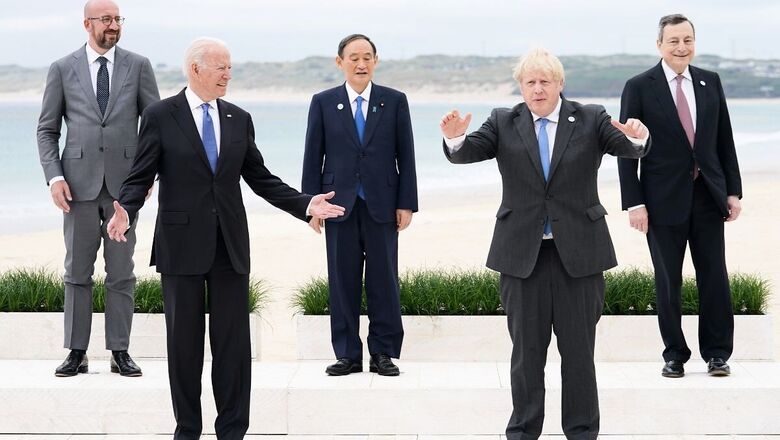
views
Just last year, then US President Donald Trump had described the G-7 that includes Canada, France, Germany, Italy, Japan, and the UK along with the US, as “a very outdated group of countries” not properly representing “what’s going on in the world”. This year it’s a different story with US President Joe Biden trying to put his own stamp on global politics using the G-7 as the launch pad of his diplomatic outreach. He is intent on underscoring during his first overseas trip as president that “the United States is back and democracies of the world are standing together to tackle the toughest challenges and the issues that matter most to our future.”
At the bilateral level with the UK, Biden and the UK Prime Minister Boris Johnson will be aiming to revitalise their relationship, after the turbulence of the Trump years and the post-Brexit adjustment. In an attempt to refresh their so-called “special relationship,” the two leaders have signed a new updated version of the Atlantic Charter, pledging to work together to solve global challenges and enhancing cooperation in areas as wide-ranging as defending democracy, reaffirming the importance of collective security, and building a fair and sustainable global trading system. There are differences between the two sides on trade across the Irish Sea where Washington has repeatedly underlined that the UK-EU row over the Northern Ireland Protocol should not be allowed to imperil the stability provided by the Good Friday Agreement.
Vaccinating the World
For Biden, it’s a packed agenda during his eight-day trip that will see him meeting the Queen at Windsor Castle, the 12th serving US president the Queen will be hosting as monarch, attending G-7 leaders’ meeting, participating in his first NATO summit as president and finally coming face to face with Russian President Vladimir Putin in Geneva. The last one, perhaps, will be most contentious and will be watched by many around the world.
The G-7 summit meeting under the UK Presidency is focused on certain key themes—leading the global recovery from coronavirus while strengthening resilience against future pandemics; promoting future prosperity by championing free and fair trade; tackling climate change and preserving the planet’s biodiversity; and championing shared values and open societies. But it is likely that recovery from COVID-19 will be front and centre. Boris Johnson has ambitiously articulated that the G7 would “begin the framing of a new global treaty on pandemic preparedness so the world is never caught out in the same way again.”
ALSO READ | Poorest Nations, Most Population Uncovered: G-7’s Billion Jab-plan Shows Global Imbalance
In this context, the G-7 is expected to call for greater global coordination to help vaccinate the world. Arguing that US values “call on us to do everything we can to vaccinate the world against COVID-19,” the Biden administration has already announced the US will donate half a billion coronavirus vaccine doses to over 90 of the world’s poorest countries. This is to be welcomed but the scale of the global crisis is enormous and other major powers will have to pitch in a major way given the aim of distributing 1.8 billion doses of vaccines globally by early next year.
India’s Consistent Engagement with G-7
While the G-7 is made up of the seven of the world’s largest economies, they have been bound together by a shared sense of values such as democracy, human rights and sustainable development. As geopolitical tensions sharpen among major powers around the world, there is an attempt to redefine the purpose of the G-7. The UK has invited India, along with Australia, the Republic of Korea and South Africa, as guest countries for the G-7 Summit in an attempt to underscore the need for like-minded nations, in particular democracies, to come together to manage global governance more effectively. The advanced industrial nations are recognising the need to expand their ambit if the geopolitical and geoeconomic challenge from a rising China is to be effectively tackled. And India has emerged as a major partner in that endeavour.
This will be the second time Prime Minister Narendra Modi will be participating in a G-7 meeting since 2014. Last year too Donald Trump wanted to invite Modi but that couldn’t happen due to the pandemic in the US. Though Modi was to go in person this year, due to the pandemic situation in India he will be participating virtually in the outreach sessions. India’s consistent engagement with the G-7 over the last several years adds another layer to its already growing engagement with the West as it seeks to build partnerships with countries that are willing to enhance its capabilities and its leverage in global governance. India is more at ease in dealing with the West today than it has ever been in its post-independence history.
From India’s engagement with its Quad partners in the Indo-Pacific to its burgeoning ties with the West, we are witnessing unprecedented activism in the Indian foreign policy posture that tells a story about India’s rise that is quite distinct from the doom and gloom often portrayed in the Indian domestic landscape. As India engages the world more confidently, the world is reaching out to India more substantively as well. India’s presence at the G-7 is a tribute to the inherent strength of the country that should not be underestimated despite the occasional challenges that the nation may face.
This article was first published on CNBC TV18.
Read all the Latest News, Breaking News and Coronavirus News here.




















Comments
0 comment